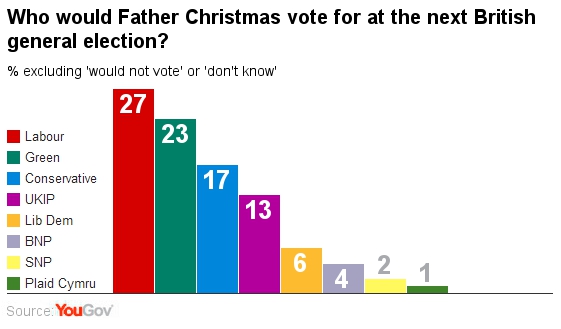 By Will Jennings, Professor of Political Science and Public Policy at University of Southampton (Academia.edu, Twitter). Read more posts by Will here.
By Will Jennings, Professor of Political Science and Public Policy at University of Southampton (Academia.edu, Twitter). Read more posts by Will here.

Source: @john_neptune
“An urgent message for Father Christmas: all we wish for is our country back!” was the slogan spotted emblazoned across an upside down union jack flag in Hedge End, Hampshire this week. Poor old Santa is increasingly being dragged into the mud of partisan politics — on both sides of the Atlantic. Despite the plea for Father Christmas to return the UK to some rose-tinted age, British voters are not convinced that he is a Ukip supporter. Surveyed by YouGov last December, just 13% of people thought that Father Christmas would vote Ukip. This perhaps should not be a surprise given that, as it has been pointed out, is “is effectively a foreigner doing a job at the expense of hard-working parents across the country.” The much more widespread view was that Santa was a Labour voter (the view of 27% of respondents), no doubt because of his obvious distributive politics, or a Green (23%), due to the low carbon emissions of his sleigh and his role in conservation of Reindeer. As British politics has become increasingly fragmented, and struggles to cope with a new era of multi-party politics, there is no clear consensus among the electorate on which side of the partisan divide Santa belongs.
These figures mask the underlying partisan divide in how voters view Santa. Once “don’t knows” and non-voters are excluded, 64% of Labour supporters think he votes Labour. Among Conservative supporters, 59% are of the view that Santa shares their political predilection. Meanwhile, 60% of Ukip supporters believe that Santa is a member of Nigel Farage’s purple army, despite his distinctly red suit and careless disregard for EU border controls as he delivers presents across the world. Even when it comes to Santa, most people can’t put politics aside and see him through a partisan prism.
The same pattern is observed in the US, where a Public Policy Polling survey in 2012 asked “Do you think Santa Claus is a Democrat or a Republican?” In response, 44% of the US public thought Santa was a Democrat and 28% a Republican, with 28% unsure. Again, once we break the numbers down by partisanship we see starker divisions. Some 79% of Democrats believe Santa votes just like them, compared to 61% of Republicans – suggesting that even some partisan Republicans can recognise the distributive politics involved in giving large numbers of presents to children. Indeed, the evidence suggests that Santa has been a victim of growing political polarization in the US. Strikingly, 85% of Republicans thought that Santa was more likely to leave Obama a lump of coal rather than gifts, suggesting that the festive spirit has not exactly led Americans to put aside their partisan differences. Indeed, Republicans are marginally more likely than Democrats, by 49% to 41%, to tell daddy if they see mommy kissing Santa Claus, though the jury is still out on the political implications of this. The dragging of Santa into the world of partisan politics on both sides of the Atlantic offers a nice illustration of the degree to which partisanship structures so much of our everyday lives – even when it relates to (shhhhhhh!) fictional characters…
